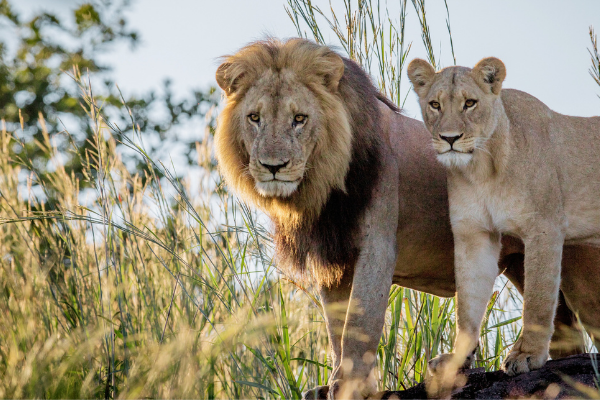Britain is poised to ban the import of hunting trophies from thousands of endangered and threatened species, including the frequently killed “African Big Five” (lions, leopards, rhinos, elephants and buffaloes). Announced on Dec. 10 by Environment Secretary George Eustice, the new ban will protect a range of species including nearly 6,000 animals who are currently threatened by international trade.
“More animal species are now threatened with extinction than ever before in human history and we are appalled at the thought of hunters bringing back trophies and placing more pressure on some of our most iconic and endangered animals,” said Eustice.
Britain’s ban will also cover over 1,000 additional species who are considered near-threatened or worse, such as African buffalo, zebra and reindeer. The restrictions, which must be approved by a vote in Parliament before being enacted, were expanded from the original proposal after 86% of responses from the British public called for further action. Friends of Animals cheers not only the government’s action but also the activism of its citizens in demanding the number of species covered be expanded.
“This would be one of the toughest bans in the world, and goes beyond our manifesto commitment, meaning we will be leading the way in protecting endangered animals and helping to strengthen and support long-term conservation,” added Eustice.
“If passed, this would be a milestone victory in the global effort to end this barbaric behavior,” said Priscilla Feral, president of Friends of Animals. “But what makes it real is a timeline. The British lawmakers need to set a date for stopping the import of animal parts, and the sooner the better.”
In June, Friends of Animals filed a rulemaking petition with the U.S. Fish and Wildlife Service to stop the importation of all sport-hunted trophies of threatened and endangered animals. FWS hasn’t responded yet. If the agency denies the petition, FoA will then challenge it in court.
“If the goal of the Endangered Species Act is conservation of species, our regulations should not grant a loophole legalizing the slaughter of the most vulnerable among them and then add insult to injury by permitting the glorification of the killing through the importation of their dismembered body parts,” said Stephen Hernick, an attorney for Friends of Animals Wildlife Law Program. “Permitting individuals to hang lion and leopard heads or mount elephant tusks on the walls of their homes, for example, undermines the message that we should be protecting them.”
Banning the import of trophies into the United States will have a profound impact on threatened and endangered species since American hunters kill far more animals than trophy hunters from any other nation. U.S. accounts for 71 percent of the import demand, importing 150,583 animal trophies from 2004 to 2014. The next highest nations, Germany and Spain, account for less than 5 percent each, according to an analysis of the global hunting trade compiled by the International Fund for Animal Welfare. Although currently the UK is not a significant player in trophy hunting overseas, it could be argued that the concept of trophy hunting was invented by the British Empire during Victorian times, claims the IFAW.
“While the UK is by no means the biggest destination for international hunting trophies, nevertheless UK-based hunters frequently travel overseas to kill animals for fun, including species that are threatened with extinction,” said Dr, Mark Jones, head of policy for Born Free. “The proposed ban will send a clear signal that the UK does not condone the brutal killing of threatened wild animals for this so-called ‘sport’ by UK citizens.”
This summer, Friends of Animals also delivered a setback to some U.S. trophy hunters when Connecticut Governor Ned Lamont signed the Big 5 African Trophies Act into law. Also known as Cecil’s Law,” after the notorious killing of a beloved African lion, the new law bans the sale of body parts of African elephants, giraffes, leopards, lions and rhinos.
“The social elite pastime of so-called ‘trophy hunting’ is nearly 200 years old, and like the outhouse, the quill pen and the coal-fired steam train, its time has come and gone,” said state Senator Christine Cohen, in support of the legislation FoA helped draft.

